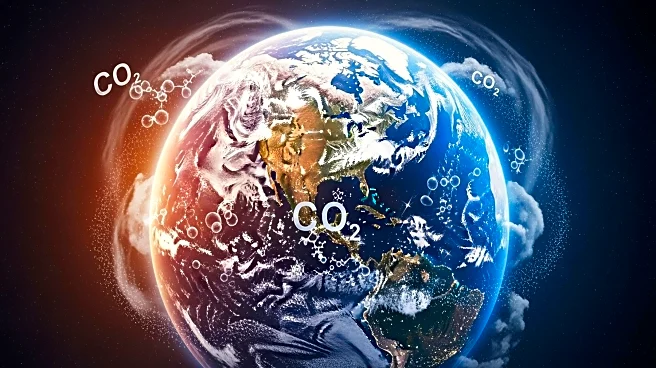What's Happening?
The World Meteorological Organization (WMO) has reported a significant increase in atmospheric carbon dioxide levels in 2024, marking the largest annual rise since modern measurements began in 1957. The global average concentration of CO2 surged by 3.5
parts per million (ppm) to reach 423.9 ppm, surpassing the previous year's increase of 2.3 ppm. This trend of accelerating annual increases has been observed since the 1960s, with current levels comparable to those seen 3 to 5 million years ago. The WMO attributes this record surge to ongoing fossil fuel emissions, increased emissions from wildfires, and a reduction in the carbon uptake by the world's lands and oceans. The recent El Niño weather pattern has exacerbated these conditions, leading to higher global temperatures and reduced carbon absorption, particularly in tropical regions like the Amazon.
Why It's Important?
The record increase in CO2 levels has significant implications for global climate change, as excess carbon dioxide in the atmosphere contributes to long-term warming effects. The heat trapped by CO2 and other greenhouse gases is intensifying climate change, leading to more extreme weather events. This development underscores the urgent need for global efforts to reduce fossil fuel emissions and enhance carbon capture mechanisms. The decline in the planet's ability to absorb excess carbon, particularly by land sinks, raises concerns about the long-term effectiveness of natural carbon absorption processes. If this trend continues, it could hinder efforts to mitigate climate change and achieve international climate targets, impacting ecosystems, economies, and societies worldwide.
What's Next?
The WMO's findings highlight the necessity for immediate action to curb fossil fuel emissions and strengthen carbon capture strategies. Scientists and policymakers may need to reassess current climate policies and explore innovative solutions to enhance the planet's carbon absorption capabilities. The ongoing analysis of carbon uptake trends will be crucial in understanding the long-term implications of these changes. As the world faces increasing climate challenges, international cooperation and commitment to sustainable practices will be essential in addressing the root causes of rising CO2 levels and mitigating their impact.
Beyond the Headlines
The decline in carbon uptake by natural sinks, particularly in the northern hemisphere, suggests potential long-term shifts in the planet's ability to regulate atmospheric CO2 levels. This could lead to more severe climate impacts, including biodiversity loss, altered weather patterns, and increased pressure on vulnerable ecosystems. The ethical and legal dimensions of climate change mitigation efforts may also come into focus, as nations grapple with the responsibility to reduce emissions and support global climate initiatives. The WMO's report serves as a critical reminder of the interconnectedness of environmental, economic, and social systems in the face of climate change.















